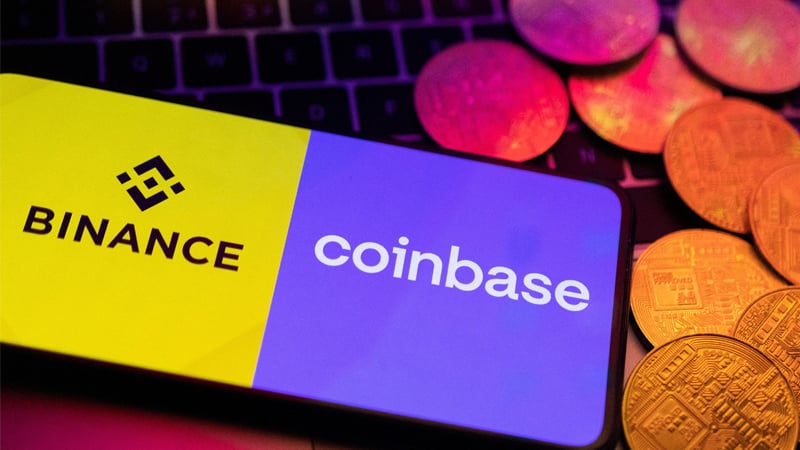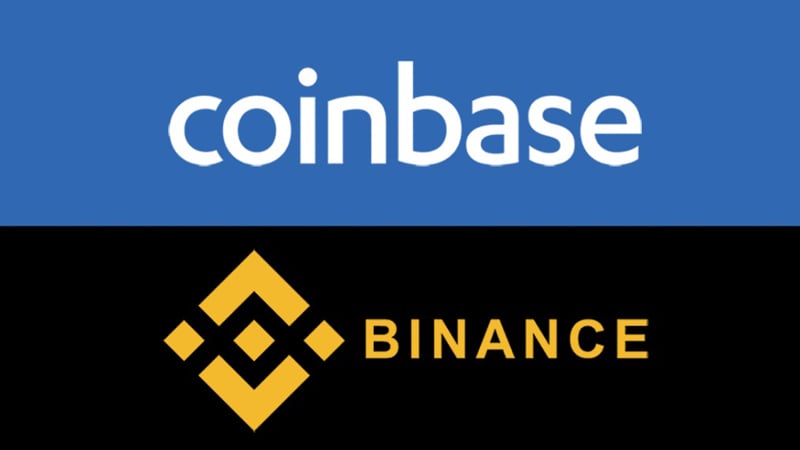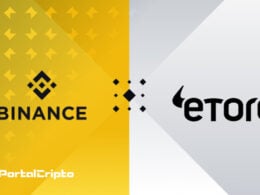Binance.EN e Coinbase stand out as two of the main cryptocurrency exchange platforms available on the market. Choosing between the two depends on a number of crucial factors, including the variety of cryptos available, commission rates and other decisive elements.
Both Coinbase and Binance.US are recognized for their relevance in the cryptocurrency exchange sector. Throughout this text, Binance.US will be referred to simply as Binance, representing the American segment of the largest global Binance. The comparison will focus on Coinbase Advanced Trade, known for its reduced fees compared to the standard Coinbase service, here just called Coinbase.
In mid-2023, both platforms, Binance and Coinbase, were the target of lawsuits by the Securities and Exchange Commission, accused of illegal operations in various regulatory aspects and offering and selling unregistered securities. Additionally, Binance has faced accusations related to mismanagement of customer funds. In response, Binance assured the security of its users' assets, while Coinbase stated that it would maintain its operations without changes.
When it comes to operational costs, trading fees are usually the biggest burden for users. These fees can add up quickly, especially for those who trade in high volume. It is common for exchanges to offer discounts based on monthly trading volume. Binance stands out for offering even more advantageous conditions.
Both Binance and Coinbase adopt a maker-taker pricing structure, where fees vary depending on whether the user is adding or removing liquidity from the market. Trading fees therefore differ not only by volume but also by the nature of the executed order. Notably, Binance offers the possibility of full commission exemption on select Bitcoin and Ethereum trades.
Below is a breakdown of how each exchange structures its commission rates, varying depending on the cryptocurrency traded, whether Bitcoin and Ethereum (Level 0) or other less popular cryptos (Level 1).
In this article, we will discuss:
Binance Trading Fees
Binance establishes a fee schedule for transactions involving cryptocurrencies other than Bitcoin and Ethereum. This structure is detailed and specific for each type of operation, keeping up to date with fluctuations and trends in the crypto market.
| 30 day volume | creator | Taker |
|---|---|---|
| Less than $10.000 | 0,40 percent | 0,60 percent |
| $10,000 – $50,000 | 0,25 percent | 0,40 percent |
| $ 50,000 - $ 100,000 | 0,15 percent | 0,25 percent |
| $100.000 – $1 million | 0,10 percent | 0,20 percent |
| US$1 million – US$20 million | 0,08 percent | 0,18 percent |
| US$20 million – US$100 million | 0,05 percent | 0,15 percent |
| US$100 million – US$300 million | 0,02 percent | 0,10 percent |
| US$300 million – US$500 million | 0 percent | 0,08 percent |
| $500 million and more | 0 percent | 0,05 percent |
Coinbase Advanced Trade Trading Fees
| 30 day volume | creator | Taker |
|---|---|---|
| Less than $10.000 | 0,40 percent | 0,60 percent |
| $ 10,000 - $ 50,000 | 0,25 percent | 0,40 percent |
| $ 50,000 - $ 100,000 | 0,15 percent | 0,25 percent |
| $100.000 – $1 million | 0,10 percent | 0,20 percent |
| US$1 million – US$15 million | 0,08 percent | 0,18 percent |
| US$15 million – US$75 million | 0,06 percent | 0,16 percent |
| US$75 million – US$250 million | 0,03 percent | 0,12 percent |
| US$250 million – US$400 million | 0 percent | 0,08 percent |
| $400 million and more | 0 percent | 0,05 percent |
The results indicate fierce competition: for cryptocurrencies other than Bitcoin or Ethereum, the main fees charged by Binance and Coinbase are practically identical, except for some specific variations in the cost structure. For accumulated transactions of up to US$15 million in a 30-day period, the fees charged are equivalent. However, there is an advantage to using Binance: the platform offers an additional 25% reduction in transaction fees if payment is made using BNB, Binance's own cryptocurrency.
To illustrate, suppose an investor traded the equivalent of US$25.000 in the last 30 days and wants to make a new trade of US$10.000. On Coinbase, fees would be 0,25% or 0,40% for maker or taker positions, totaling a cost of $25 or $40, respectively. In contrast, on Binance, the investor would have an equivalent cost for the same transaction, but if they chose to pay the fees with BNB, the fees would decrease to $18,75 or $30, depending on the position held in the transaction.
Advantage: Binance presents significant benefits, especially when it comes to the set of recurring fees that users tend to face. In addition to offering an additional discount, the platform allows free operations in the two most liquid and trading cryptocurrencies on the market: Bitcoin and Ethereum. Considering the prevalence and preference of traders for these cryptocurrencies, Binance stands out as an attractive option for many crypto investors.
Binance vs. Binance Coinbase: supported cryptocurrencies
An impartial analysis indicates that Coinbase has an advantage in terms of diversity of available cryptocurrencies, offering access to 253 cryptos, while Binance offers 153, approximately 60% of what its competitor offers.
However, the relevance of this variety can be comparable to a vast buffet: the presence of a specific cryptocurrency becomes irrelevant if there is no interest in trading it. Focusing on the 12 cryptocurrencies with the largest market capitalization, Binance has a slight advantage by making them all available, while Coinbase allows access to 10. Both exchanges trade Bitcoin, but Binance distinguishes itself by including BNB, its native cryptocurrency, and XRP on your list.
Advantage: In this regard, Coinbase is recognized for having a broader selection, although practical relevance depends on the specific needs of the trader.
Binance vs. Binance Coinbase: Staking Rewards
In a comparison between Binance and Coinbase in terms of rewards for staking, Binance has made significant progress in terms of the number of cryptocurrencies accepted in its staking programs, surpassing Coinbase in this regard.
Staking is a mechanism that allows cryptocurrency holders to earn income by participating in the transaction validation process, thus contributing to the security and operability of the network. The exchanges, in this case, credit the income directly to the user's account, deducting the applicable fees. Both Coinbase and Binance apply fees on these rewards.
Coinbase offers staking for six cryptocurrencies, including Ethereum, as well as Solana and Cardano. The platform also offers other types of rewards through DeFi (with restrictions in the US) and what it calls “cloud staking” for more than 15 cryptocurrencies. Cloud staking represents a more complex and advanced approach.
In contrast, Binance allows staking on 27 cryptocurrencies, also including Ethereum, Cardano and Solana.
Comparing the rewards offered, it appears that Binance consistently presents more attractive rewards in cryptocurrencies common to both platforms.
Advantage: Binance stands out compared to Coinbase in terms of the variety of cryptocurrencies accepted for staking and the profitability of rewards on shared coins. However, the preference for one platform or another may vary depending on the user's specific cryptocurrency portfolio.
Binance vs. Binance Coinbase: Deposit and Withdrawal Fees
Both Binance and Coinbase exempt their users from fees for ACH deposits in US dollars. In transactions via bank transfer, Binance has an advantage with the exemption of fees for deposits and a fixed fee of US$15 for withdrawals within the country. On the other hand, Coinbase applies a fee of US$10 for deposits and US$25 for withdrawals via bank transfer.
Advantage: Binance stands out for offering a more advantageous fee model for both ACH and bank transfers, being a preferred option for users who make frequent transfers.
Binance vs. Binance Coinbase: customer support
Customer service at cryptocurrency exchanges has received more attention recently. Coinbase has significantly expanded its support options, including 24/7 phone support and online chat, in addition to the existing email and ticketing system. This is particularly useful for suspicious activity situations, allowing users to quickly lock their accounts.
Binance, for its part, has also improved its customer support by introducing 24/7 online chat in addition to the ticket system, keeping its trading costs competitive.
Advantage: Coinbase has the edge due to its wider range of customer support options.
Conclusion
When it comes to the most crucial aspect of an exchange, which is transaction costs, Binance stands out with lower fees. However, in aspects such as the variety of cryptocurrencies and quality of customer support, Coinbase has significant advantages. Therefore, the choice between Binance and Coinbase should be based on the user's individual priorities, whether they are looking for lower transaction fees, a wider selection of cryptocurrencies, or robust customer support.












